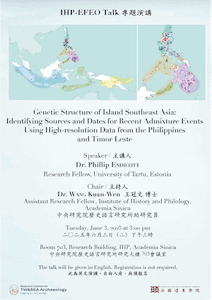
演講 I: Philiip ENDICOTT 博士
03 JUNE 25
IHP-EFEO 專題演講
講者:Dr. Phillip ENDICOTT
講題:Genetic Structure of Island Southeast Asia:Identifying Sources and Dates for Recent Admixture EventsUsing High-resolution Data from the Philippines and Timor Leste
主持人:王冠文博士(本所助研究員兼臺灣與東南亞考古學研究室召集人)
日期:2025年6月3日(週二)下午3:00
地點:本所研究大樓703會議室
主辦單位:本所臺灣與東南亞考古工作室,法國遠東學院臺北中心
摘要 :
The first humans in Insular Southeast Asia (ISEA) arrived at least 50,000 thousand years ago and the subsequent history of the region includes further major waves of migration that have left genetic imprints across the region. The last of these is associated with the spread of the Malayo-Polynesian (MP) branch of the Austronesian language family, which commenced at least 3,000 years ago but the resulting genetic footprint is unresolved.Attempts to correlate the distribution of MP languages with measures of DNA diversity have suffered from incompatible chronologies, with genetics typically displaying signals from the Pleistocene. Where appropriate methods have been employed the results consistently point to the Philippines as a potential source for admixture events within the last 3,000 years but rely on very few data points. Here, I describe a state-of-the-art investigation of ISEA genetic diversity that includes high-resolution data from 123 ethnolinguistic groups of the Philippines and Timor Leste, an ongoing region of contact between Austronesian and Papuan languages. The results uncover hitherto unsuspected genetic structure within the Philippines, identify specific components found across eastern Indonesia and Sulawesi, to the exclusion of potential sources in Luzon.
主辦單位:本所臺灣與東南亞考古工作室,法國遠東學院臺北中心
❈此為英文演講,自由入座,無需報名
演講
講者:Dr. Phillip ENDICOTT
講題:Genetic Structure of Island Southeast Asia:Identifying Sources and Dates for Recent Admixture EventsUsing High-resolution Data from the Philippines and Timor Leste
主持人:王冠文博士(本所助研究員兼臺灣與東南亞考古學研究室召集人)
日期:2025年6月3日(週二)下午3:00
地點:本所研究大樓703會議室
主辦單位:本所臺灣與東南亞考古工作室,法國遠東學院臺北中心
摘要 :
The first humans in Insular Southeast Asia (ISEA) arrived at least 50,000 thousand years ago and the subsequent history of the region includes further major waves of migration that have left genetic imprints across the region. The last of these is associated with the spread of the Malayo-Polynesian (MP) branch of the Austronesian language family, which commenced at least 3,000 years ago but the resulting genetic footprint is unresolved.Attempts to correlate the distribution of MP languages with measures of DNA diversity have suffered from incompatible chronologies, with genetics typically displaying signals from the Pleistocene. Where appropriate methods have been employed the results consistently point to the Philippines as a potential source for admixture events within the last 3,000 years but rely on very few data points. Here, I describe a state-of-the-art investigation of ISEA genetic diversity that includes high-resolution data from 123 ethnolinguistic groups of the Philippines and Timor Leste, an ongoing region of contact between Austronesian and Papuan languages. The results uncover hitherto unsuspected genetic structure within the Philippines, identify specific components found across eastern Indonesia and Sulawesi, to the exclusion of potential sources in Luzon.
主辦單位:本所臺灣與東南亞考古工作室,法國遠東學院臺北中心
❈此為英文演講,自由入座,無需報名
演講

